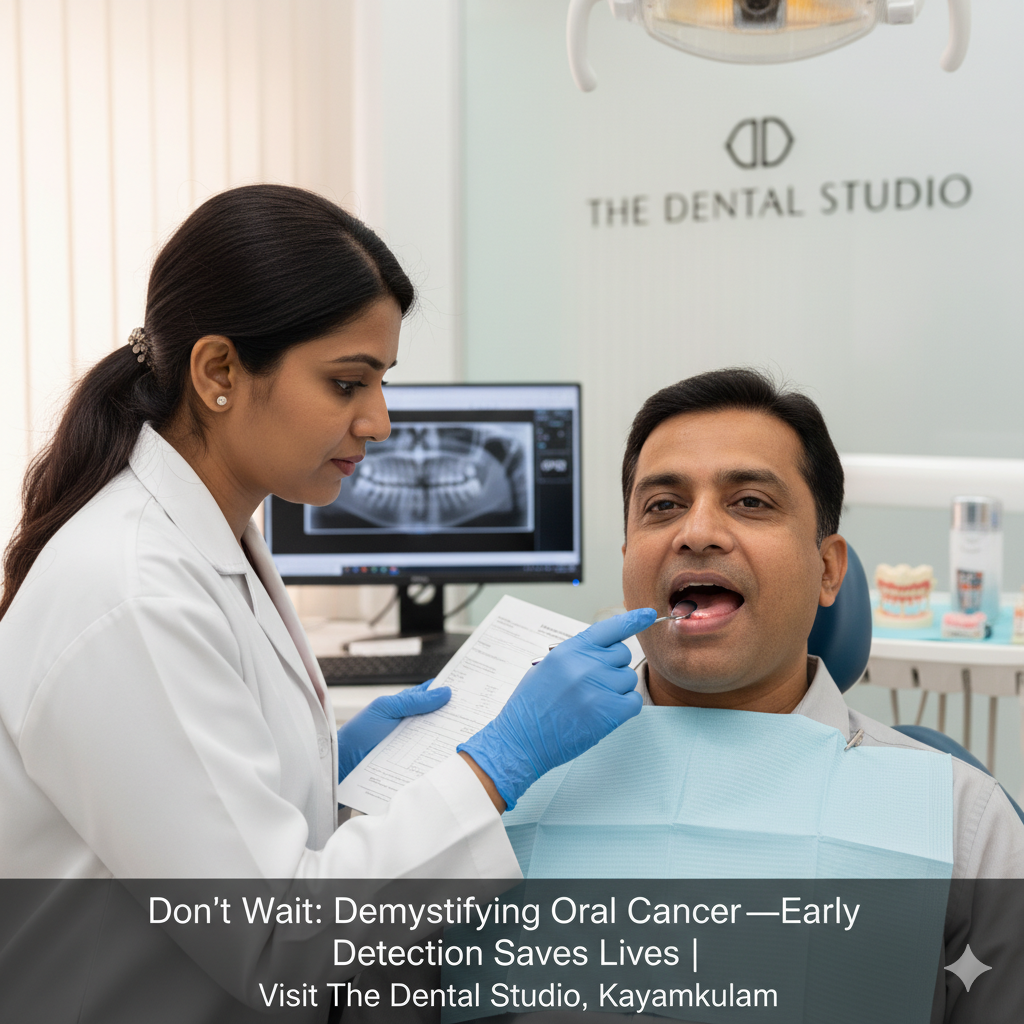Don’t Wait: Demystifying Oral Cancer—Early Detection Saves Lives | Visit the Best Dental Clinic Kayamkulam
• 5 min read • By Dr Sajitha S

The Critical Importance of Early Detection
Oral cancer—cancer of the mouth, throat, tongue, lips, and gums—is a serious concern, but finding it early dramatically increases the survival rate. Unfortunately, many cases go undetected until they reach advanced stages, often because early signs resemble common mouth sores or dental issues.
Your dentist is your first line of defense. A thorough oral examination can lead to identifying the oral cancer at a very early stage, turning a complex diagnosis into a manageable one. If you are searching for a specialized dentist near me, ensure they include oral cancer screening in every routine check-up.
Understanding the Causes: What Triggers Oral Cancer?
Understanding the potential causes and risk factors empowers you to make proactive choices for prevention.
What are the Possible Causes?
The majority of oral cancer cases link directly to lifestyle habits:
- Tobacco Use: Smoking cigarettes, cigars, pipes, and using chewing tobacco or paan dramatically increase your risk. Tobacco contains carcinogens that directly damage the cells in your mouth.
- Heavy Alcohol Consumption: Excessive alcohol intake, especially when combined with tobacco use, significantly elevates the cancer risk.
- Human Papillomavirus (HPV): Certain high-risk strains of HPV, transmitted through oral sex, are increasingly linked to cancers at the back of the mouth and throat (oropharyngeal cancer).
- Sun Exposure: Prolonged and unprotected exposure to the sun is a primary cause of lip cancer.
- Age and Genetics: While anyone can develop oral cancer, the risk increases with age (typically over 40). A family history of head and neck cancer may also increase susceptibility.
Recognizing the Red Flags: When to See Your Dentist
Oral cancer is a disease of persistent change. Do not ignore minor abnormalities, especially if they last for more than two weeks. Your dental professional recognizes subtle signs that you might miss.
Non-Healing Ulcers
This is the most critical and common sign. A normal mouth ulcer (canker sore) usually heals on its own within 7 to 14 days. If you have a non-healing ulcer or sore on your lip, tongue, cheek, or gum that lasts for three weeks or more, you must seek professional evaluation immediately. Unlike benign ulcers, cancerous lesions often do not have a defined border and can feel firm.
Other Suspicious Signs in the Oral Cavity:
- Red or White Patches (Erythroplakia or Leukoplakia): White patches are common, but red patches (erythroplakia) are highly suspicious. Your dentist will investigate any colored patches that you cannot rub off.
- Delayed Healing in Extraction Sockets: The area where a tooth was removed should heal cleanly within a couple of weeks. If you experience delayed healing in extraction sockets—where the tissue fails to close or a persistent, painful, or unusual growth appears weeks after the extraction—it can occasionally signal an underlying malignancy invading the jawbone.
- Lumps and Bumps: Feel for any unexplained lumps, bumps, or persistent swelling in your mouth or neck. Oral cancer often spreads to the lymph nodes in the neck, causing a noticeable, hard, and usually painless lump.
- Difficulty: Struggling to chew, swallow, or move your tongue or jaw normally.
The Power of Routine: Why Regular Dental Checkups Matter
Regular dental checkups are crucial because they include essential oral cancer screenings. This short, simple screening often involves:
- Visual Inspection: Your dentist thoroughly examines your lips, tongue, gums, cheeks, and the roof and floor of your mouth, looking for any subtle changes in color, texture, or symmetry.
- Palpation (Feeling): Using gloved fingers, the dentist feels your entire jaw, neck, and throat area to check for any lumps, swelling, or abnormalities in the lymph nodes.
If the dentist finds a suspicious area, they will not jump to conclusions. Instead, they will usually monitor it or, if highly concerned, recommend a simple, pain-free brush biopsy or refer you to a specialist for a definitive diagnosis.
Beyond Cancer: The Importance of Pre-Procedure Screening
While not a direct cancer diagnostic tool, understanding your overall health is fundamental to any surgical procedure.
Importance of Blood Examination Before Going for an Extraction
Your dentist asks for a blood examination before going for an extraction or other minor surgery to assess critical health indicators that impact safety and healing, such as:
- Clotting Factors: Blood tests like Prothrombin Time (PT) and International Normalized Ratio (INR) ensure your blood clots properly, preventing excessive bleeding after surgery.
- Immune Status: Tests can reveal underlying infections or compromised immunity, which increase the risk of delayed healing or post-operative infection—a complication sometimes mistaken for a more serious issue like cancer.
- Systemic Conditions: They help diagnose or monitor conditions like uncontrolled diabetes or certain blood disorders, which significantly delay wound healing and can compromise recovery.
Conclusion: Your Smile, Your Health
Do not let fear prevent you from getting the necessary care. Early detection offers the best chance for successful oral cancer treatment. Make the commitment to your health today: maintain a healthy lifestyle and make routine dental checkups a non-negotiable part of your schedule.
If you are looking for preventative care or specialized screening in the region, trust the expertise of the best dental clinic Kayamkulam. A qualified cosmetic dentist in Kayamakulam can provide routine cancer screening during your check-up, offering you peace of mind and ensuring the early identification of any critical change
Leave a Reply